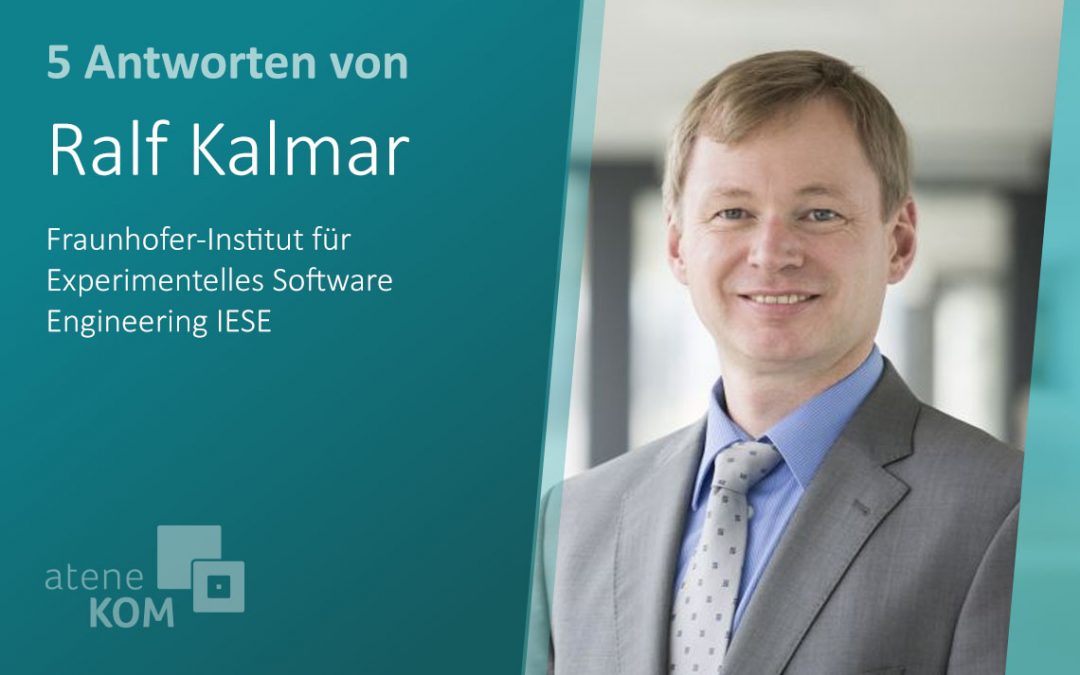In the course of digitalization, conventional agriculture is becoming intelligent agriculture – known as smart farming. Dr. Stefan Stiene from the German Research Center for Artificial Intelligence (DFKI) has already explained this to aconium GmbH, How artificial intelligence (AI) will change the agricultural industry. In diesem Interview beleuchtet Ralf Kalmar, Business Area Manager für Smart Farming at the Fraunhofer Institute for Experimental Software Engineering (IESE)emphasizes the importance of smart farming for medium-sized agricultural businesses and the need for a comprehensively networked agricultural sector.
aconium: To what extent has smart farming already found its way into German agriculture?
Ralf Kalmar: There are numerous solutions from various providers, particularly in farm data management. These tend to be used more by contractors or larger farms, as they require modern machinery and implements. Solutions for crop planning and automation are already available to a certain extent (e.g. GPS-controlled machine operation, automatic pesticide dosing, drone-based pest control, remote detection by satellite, etc.). There are also solutions to support operational processes, documentation and accounting. However, these are often tied to individual manufacturers and are too complex, especially for use on smaller farms. Many smart farming solutions are still stand-alone solutions that function independently depending on their intended use and are not networked with each other or even across providers.
aconium: What other areas of agriculture can be digitized in the future?
Kalmar: There are still some gaps and discontinuities, i.e. incompatibilities between systems, which means that farmers still have to make multiple efforts today – for example when it comes to documentation or data transfer to contractual partners. It is also difficult for medium-sized service providers to integrate new products, i.e. there is no ‘marketplace’ for data and services. There is also still a lot of potential in the further value chain up to the end consumer. Further opportunities lie in the development and integration of IoT (Internet of Things) systems. For example, automated information gathering through sensor technology can still be greatly expanded.
aconium: What challenges do farms that want to introduce smart farming solutions face?
Kalmar: At the moment, farmers often don’t know where to start and are afraid of committing too much to one provider. Trust in data protection and data security is also part of this – many companies are still doing too little here or are not communicating their position in the best possible way. Available digitalization solutions from individual manufacturers do not yet support the entire ecosystem of machines and agricultural processes. High costs for individual, sometimes isolated solutions with manageable benefits for smaller farms are delaying further comprehensive digitalization. There is a general desire to be able to use digital solutions as comprehensively as possible and across all processes. In principle, agricultural work is a cycle with many components (e.g. the nutrient cycle); therefore, digital solutions that only take parts of it into account do not yet bring sufficient benefits to individual farmers.
aconium: What needs to be changed so that farmers can overcome these challenges?
Kalmar: An open, interoperable platform would be desirable. In addition to the operators of the current platforms, the countries that have not yet provided a standardized solution for their geoinformation, for example, are also in demand here. In our opinion, the main focus should be on breaking down boundaries between manufacturers, systems and agricultural processes. If a farmer can use his digital solution across the board, for example for his entire work cycle and machinery, this will increase the willingness to implement it. Digitization must continue to be pursued on a broad scale in order to be able to offer farmers comprehensive and not just selective support.
aconium: What would you like to see in the smart farming of the future?
Kalmar: In an ideal scenario, technology would support farmers in their interaction with digital systems so that they can flexibly choose the aspects of their farm management at any time and receive individual automated support for complex or unpleasant tasks. The automation of machines and operational processes – such as documentation – offers a great opportunity for agriculture to increase efficiency and also improve product quality and ecological sustainability, for example through the reduced, optimized use of pesticides. However, all the selective advances in digitalization will not result in major progress if they are not optimally and comprehensively networked with one another. Optimal digitalization must be able to offer farmers and all other participants in the agricultural ecosystem integrated solutions that break down the current boundaries between manufacturers and operational areas. This also includes transparency for the consumer and the ability for politicians to define framework conditions more easily and assess the consequences more accurately. For further innovation, it is essential that such an ecosystem is open and offers equal opportunities to all participants and producers.
More on the digital transformation in agriculture in the specialist dossier from aconium GmbH:

